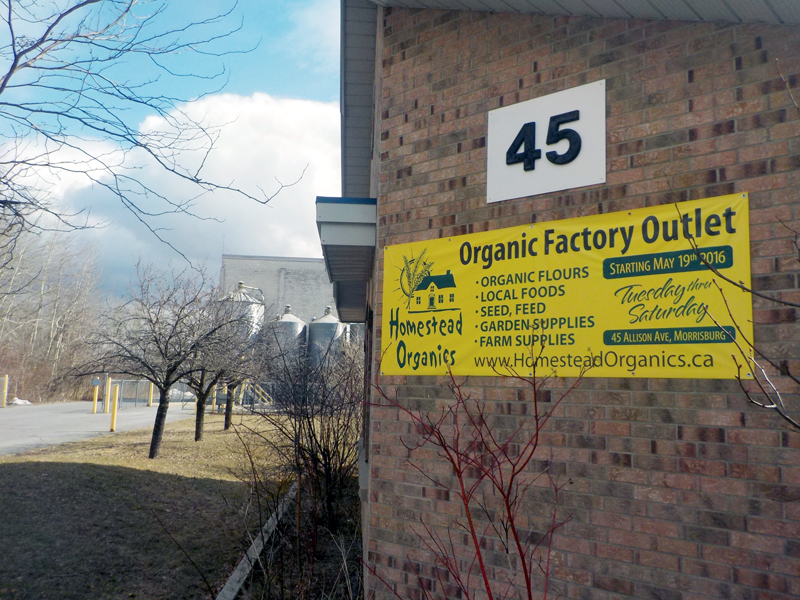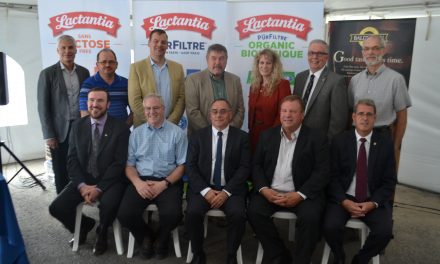End of an era
Homestead Organics’ Morrisburg location was one of multiple facilities to close up shop officially on Fri., April 13. The closure of the company means big changes in the local and provincial organic industry. Van Dusen photo
by Tom Van Dusen
AgriNews Staff Writer
MORRISBURG – After apologizing to friends and investors for letting them down, Tom Manley has exited eastern Ontario’s organic agriculture sector which he was instrumental in building over 30 years and in which he became a nationally recognized leader.
Manley’s departure comes “after losing my cash investment and my retirement fund,” he told colleagues recently while announcing the demise of his Homestead Organics with sites in Berwick, Morrisburg and Sebringville, western Ontario. It was a hard crash; in 2015, the company did $15-million in sales.
The collapse has turned Manley into a guy looking for a job: “I trust that the job market will accept me and I will be working the next 20 years to rebuild a very tardy retirement.”
In an internal notice April 5, Manley, who grew the business from a home operation started by his father, revealed that his company had “accumulated significant financial losses that we cannot resolve.”
“The 30th anniversary of Homestead Organics was not supposed to be highlighted with this conclusion,” Manley stated, adding that a trustee will liquidate assets and collect accounts receivable. “All will be settled to some percentage on a pro-rated basis from proceeds of the liquidation. Sadly, many people will lose a lot of money.”
Manley would be the first to admit the company he ran with wife Isabelle grew too fast over the past four years in its drive to remain competitive in a dynamic organic sector while developing and serving local organic agriculture.
Tight cash flow was a repercussion of that growth. As a result of slow payments, AgriCorp last fall suspended Homestead’s grain buyer license which limited its purchase of wheat, corn and soybeans from Ontario farmers.
Corrective action was underway, Manley stated at the time, including reducing operating expenses and developing new markets, especially the feed sector at Sebringville. Voluntary and involuntary staff departures were implemented; still, the financial crunch forced Homestead to give up the lucrative New York State feed market.
“I’m terribly sorry to let you down in this way,” Manley apologized. “I sincerely thank you for your confidence for so many years. I endure the stress with head high as we accomplished many good things in 30 years of developing organic agriculture.”
Launched in 1988 and eventually settling in a closed mill close to the Manley home in Berwick, in recent years Homestead expanded to a vacant factory in Morrisburg before buying an aging Sebringville facility from Hensall District Coop. At the time, Manley said opportunity knocked and he seized it.
Morrisburg was set up for warehousing, seed cleaning, mineral mixing and an outlet store. The staff roster at the company’s three sites expanded to 27 at peak and they were invited to participate in a shared ownership program.
Homestead’s many products included organic whole grains, stone ground flours, food, buying, selling and handling grain, seed, mixed livestock feeds and supplements, soil amendments and fertilizers, pest control products, and advisory services.
Manley’s closing announcement was met with mixed feelings. While Homestead’s departure leaves behind some unhappy creditors, the Manley family’s pioneering contribution in building the organic agriculture industry in Eastern Ontario was underlined by Moe Garahan, executive director of Ottawa-based sustainable advocacy group Just Food, during a talk April 7 at the Rural Summit in Kemptville.
Metcalfe grain farmer George Wright said the demise of Homestead marks the loss of a tremendous resource for organic agriculture in the region: “Farmers are going to have to scramble to meet the demand.”
North Gower organic fruit and vegetable farmer Colin Lundy saw “a little bit of chaos” as a result: “It’s possible that some local products may be a little less organic than before. It was good to know that when you bought from Homestead, you were buying from someone supporting other local farmers.”
Sources familiar with the regional industry said there’s some interest in Homestead’s assets and in continuing to offer organic grain services.













